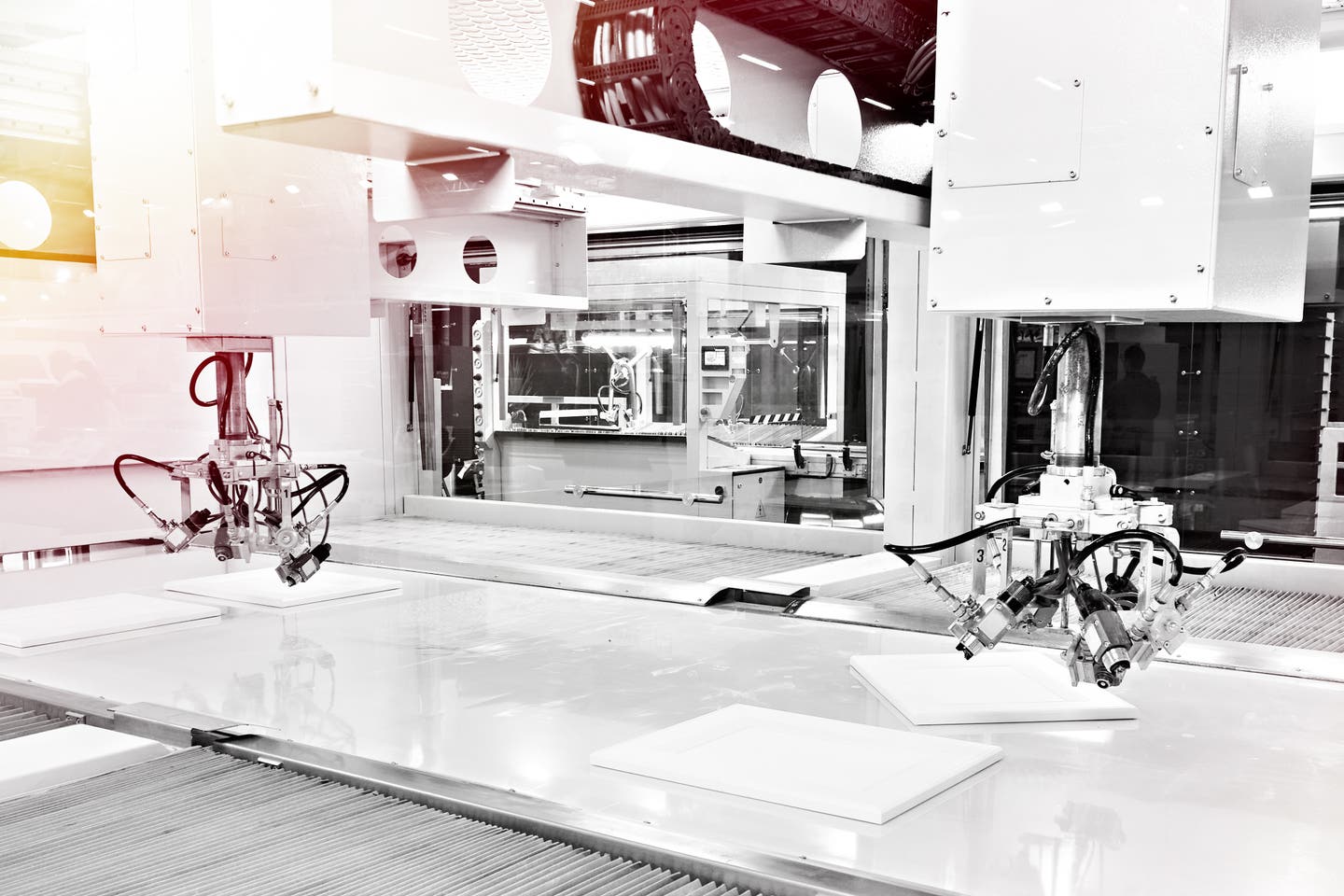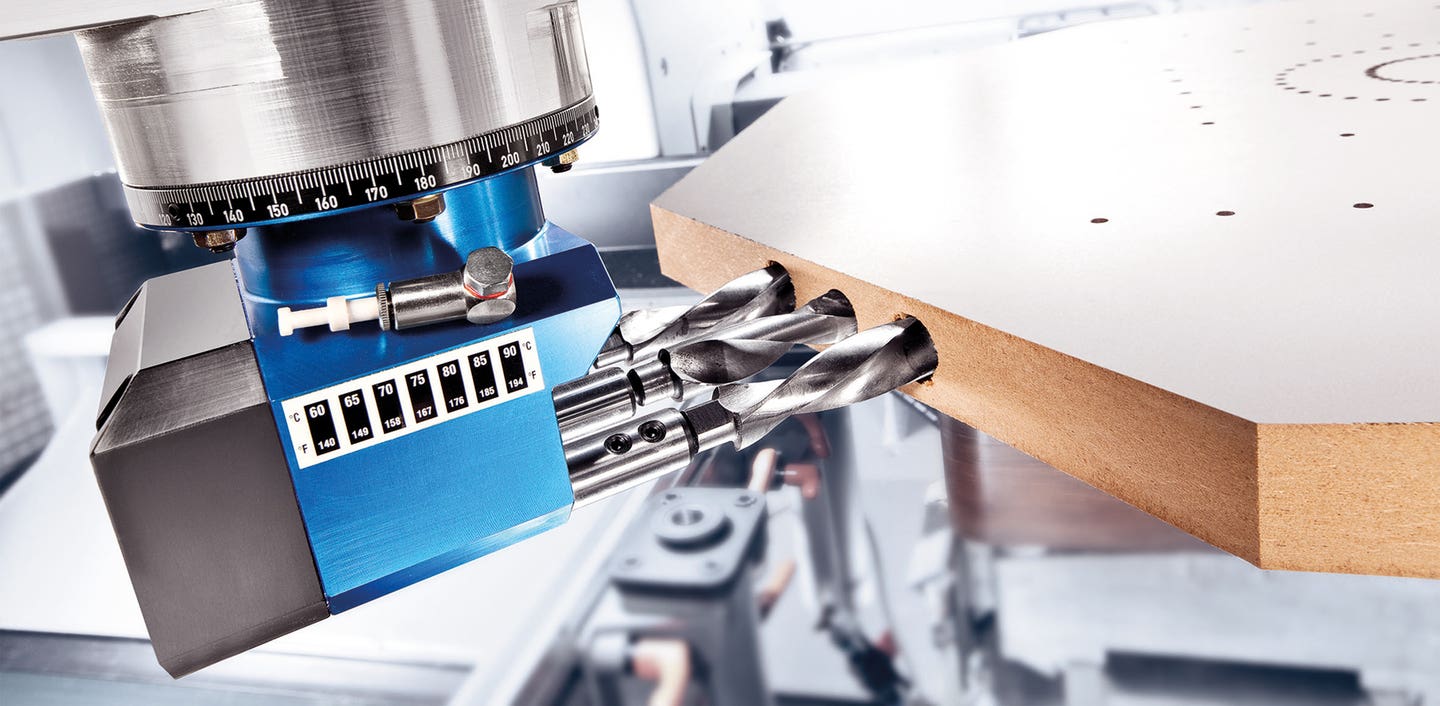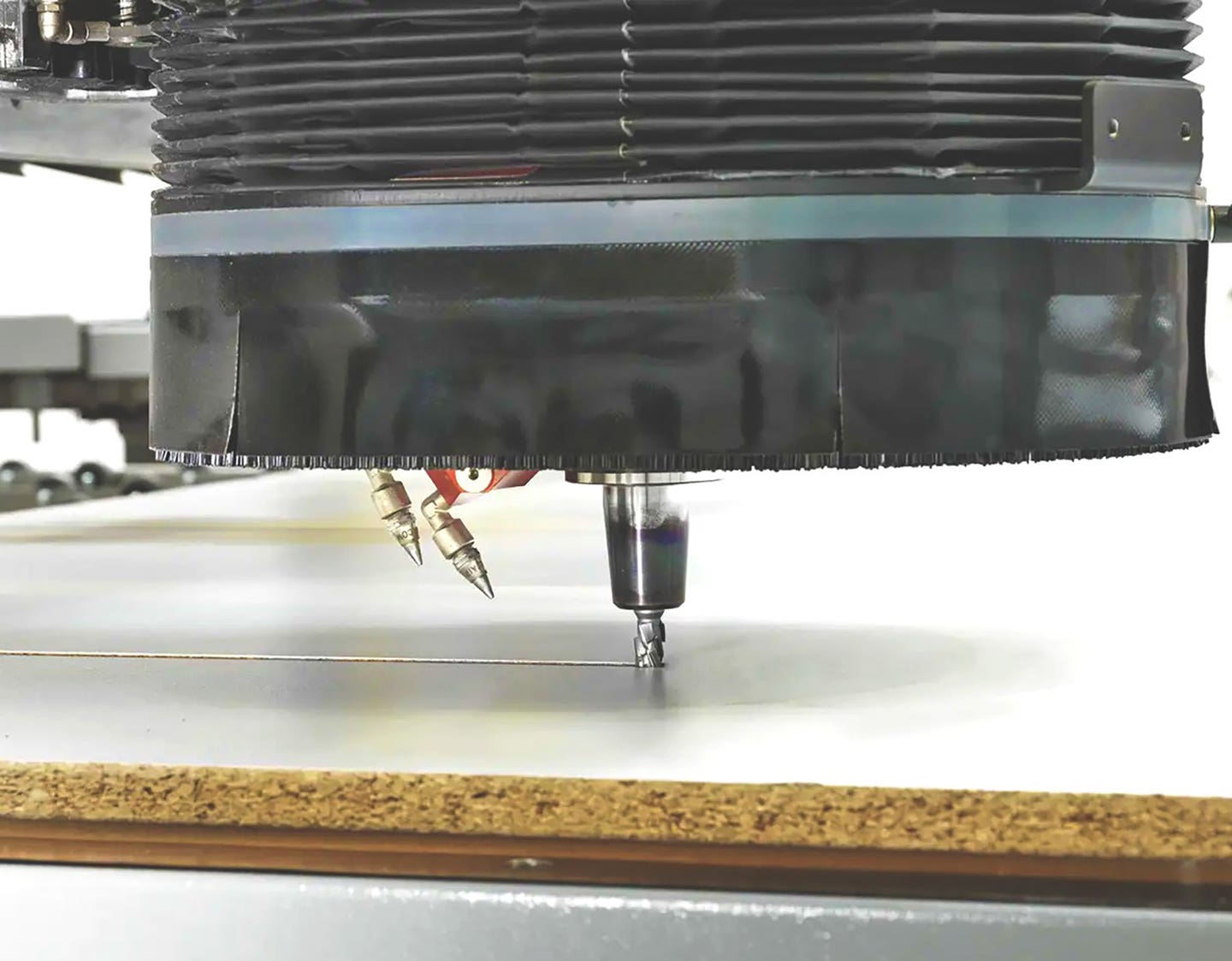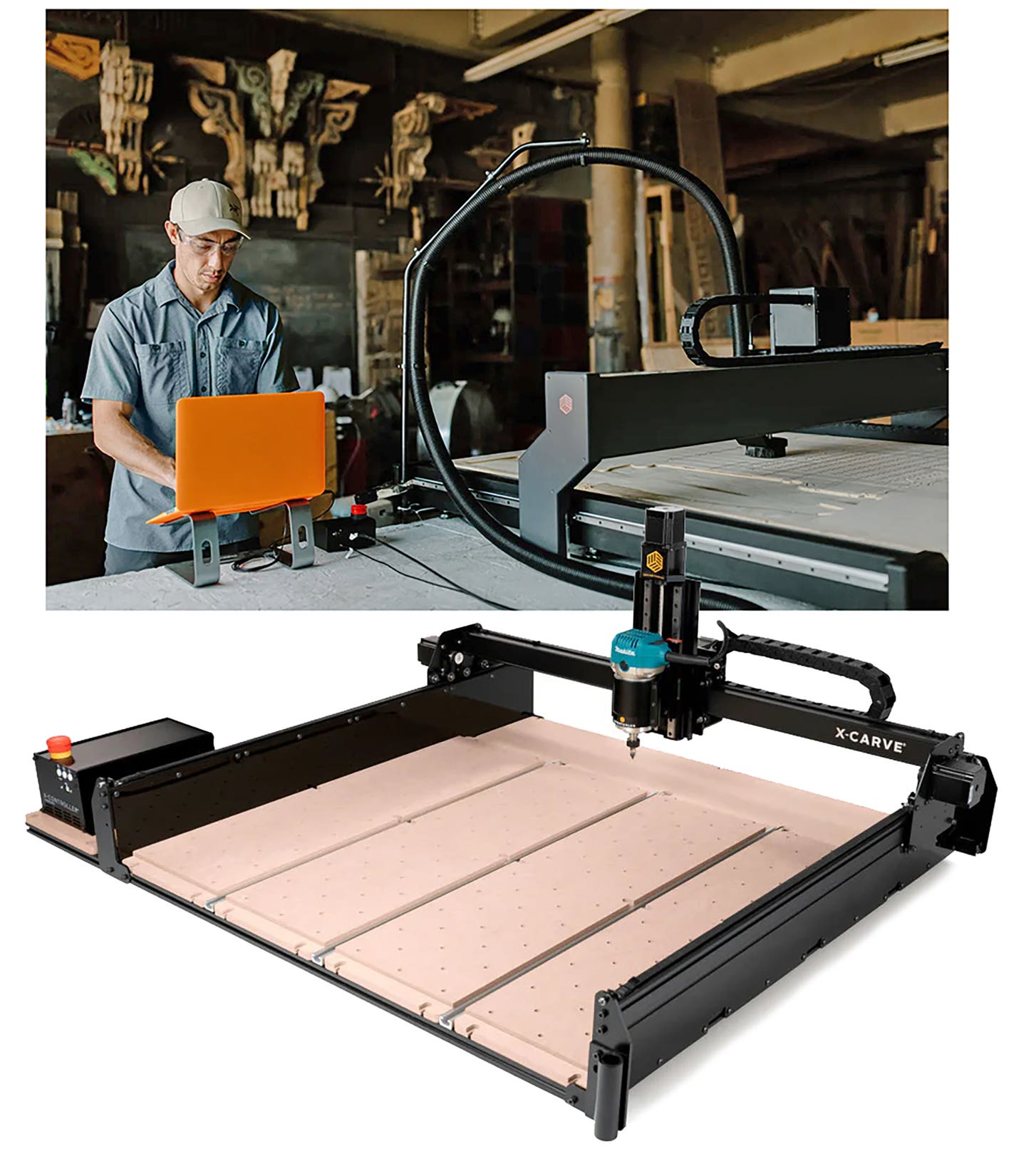Now you see it, now you don’t
NOW YOU SEE IT, NOW YOU DON’T: The market for hidden fasteners and connectors continues to expand with lots of great choices.
Building boxes takes time, and lots of training. Hidden fasteners and connectors can reduce the shop floor time during assembly, and also during milling. That’s because it’s a lot faster to tool and cut a slot or mortise for a fastener than a series of full-length dadoes and grooves for a glued joint. Fasteners can make RTA installs go a lot faster too, because once a crew gets familiar with a system, they can assemble a flat packed kitchen onsite with just a few tools. And because adding a little metal or plastic to the wood makes such a tangible difference to the bottom line, most shops now incorporate some kind of hardware in their process.
The problem is choosing which type, as there are so many well-engineered options.
Familiar names
One of the oldest manufacturers in this arena is Lamello AG, which is located in Bubendorf, Switzerland. Its products are distributed in the U.S. by Colonial Saw, which can be found online at csaw.com/lamello or at physical locations in both Massachusetts and California. The Lamello catalog offers several hidden fastener options including the newest one, Cabineo. This is a time-saving RTA cabinet connector that works without edge drilling and offers very high clamping force. It’s a great solution for shops using nested-based CNCs, because the toolpath can be machined with a standard straight-shank router bit without any tool changes. Cabineo fasteners can be covered with caps, or the parts can be inverted to allow for a completely invisible application.
Lamello’s other popular option, the P System, uses an arc-shaped T-slot, and this too can be integrated into CNC production. P connectors include the Tenso P-14 which is an invisible, self-clamping connector with a pre-load function; the detachable and self-clamping Clamex that looks like two halves of a biscuit; and the Divario that is a perfect solution for attaching fixed shelves on the jobsite. The complete Lamello system includes glue systems, specialty machines and a range of dedicated cutters.
Kentucky-based Fastenlink’s invisible connection system is made up of two components, and it can be found online at fastenlink.com. One of these is the link itself, which is essentially a plastic dowel with specially shaped ends. The other is a ramped pocket that receives the link and creates a very strong connection. The system only requires standard equipment such as a CNC router and horizontal boring machine. One end of the dowel goes in a hole, and the other slips into the ramped slot. Slide the parts, and they lock together. All that’s required is a bottle of glue and a rubber mallet – there’s no clamping or cure time. It’s fast, easy to get into, economical, and above all simple. Installers can assemble RTA casework on the jobsite with the mallet. For CNC applications, it is supported by Cabinet Vision, Microvellum, WoodCAD/CAM and KCD software.
Häfele America (hafele.com/us/en) is headquartered in North Carolina, and the company has a global reach with more than 200,000 products on the market. Many of those combine the best of both U.S. and German engineering, including several clever RTA connectors. Among them is the Ixconnect SC 8/25, a concealed and permanent plastic connector for smaller parts over 5/8” thick. It’s installed in 8mm holes without tools, and it’s a pressure fit where gluing is optional. This is essentially two ramped sleeves that expand as they are pressed together. A larger, more robust plastic and zinc alloy version, the SC 8/60, is better suited for larger parts in MDF and chipboard. That connector expands with a tightening screw, so there are a couple of small (6mm) holes in the inside of the cabinet where an Allen key is used to draw the joint together. These are then plugged with a small plastic cap, to hide the connection.
Häfele also makes the Maxifix connector system, which is particularly well suited to joinery that is permanently subjected to high loads such as cabinets, beds, counters and post furniture. This is a steel bolt with a patented head that connects with a cam that fits in a 35mm hole.
More German engineering
North Carolina is home to Hoffman USA (hoffmann-usa.com), whose parent company Hoffmann GmbH is in Bruchsal, Germany. The North American subsidiary has been supplying woodshops with the company’s familiar dovetail keys since 1990. What began as a simple piece of plastic has grown into a complete and comprehensive joinery system with various sized dovetail-shaped keys in both plastics and hardwoods, and all the machines and tooling needed to install them. The company even manufactures double miter saws that cut perfect corners for casework face frames, doors, picture frames and similar four-part products. This is a well thought out, complete joinery system. For example, the company’s MS35SF machine cuts both miters and then routs dovetail grooves for the hidden dovetail keys, all in a single set-up.
Hoffman also has a unique system for making beaded face frames, which are an elegant upgrade to traditional profiles. Depending on a shop’s joinery needs, the company can supply the machines and hidden connectors for everything from a one-man custom shop to a large production facility.
Another German innovator, Festool (festoolusa.com), has invested heavily in hidden connectors of late. It began with the introduction of the Domino joinery tools – the basic DF 500, and later on the XL DF 700. Designed to update traditional mortise and tenon joinery, they make a flawless mortise that houses a rotation-proof tenon that is far stronger than either biscuits or dowels. The floating wood tenon also has a large gluing surface area, for extra strength. The original machine is perfect for small to medium sized wood joinery, while the larger XL offers a maximum tenon size of about five and a half inches. And to complement the beechwood original tenon material, the company has added a complete family of mechanical metal and plastic hidden connectors that offer impressive strength and versatility. These include both corner and center panel connectors, and they let a woodworker quickly and easily assemble, separate, and reassemble cabinet and furniture components. All a shop needs to get started is the basic DF 500 machine and a handful of connectors, some of which are designed to work with standard shelf pin holes.
CNC solutions
Lockdowel (lockdowel.com), a California manufacturer, has gone from a boutique fastener that was inserted by hand to fully-automated options. Of late, both Laguna Tools and CNC Factory have introduced dedicated CNCs that mill for and insert Lockdowel hidden fasteners. The company’s H-Clips are the core ingredients in a no-glue, RTA cabinet assembly system. The one-piece, simple fasteners snap into routed slots, so no tools are needed and assembly is quick and easy. Think of them as a pair of barbed nylon or metal (zinc aluminum alloy) dowels of various dimensions, that are joined together by a strong base. The dowels are inserted into one cabinet part, and the base is a clip that slides into a special slot in the other part and then locks in place. That double-dowel configuration offers incredible strength and zero potential for rotation. Lockdowel also offers the Channel Lock system, which uses keyhole shaped slots made on a nested base router to house barbed fasteners. And the company also offers drawer slides that simply lock into the same keyhole slots.
OVVO (ovvotech.com) introduced its clip-together hidden fastener system to the U.S. cabinet industry at IWF 2016. The connector is relatively simple. Imagine a spring-loaded plastic dovetail that pops into a receiver and then slides sideways to lock or unlock. The newest OVVO innovation, the V-1230 connector, is well-suited to use in high grade chipboard, high pressure laminates, composite materials including solid surface, and of course solid wood.
Knapp USA (knappconnectors.com) parented its first self-tightening furniture connector, the Mobi-Champ, in 1983. It is compatible with the Lamello system and is still in production. The Champ connector is like two halves of a No. 20 plastic biscuit that are glued into components and just snap together. A later addition to the line, the Fast biscuit is a No. 20 self-tightening, non-visible plastic snap-in connector where the two halves are simply knocked into biscuit slot with a hammer. Patented cutting edges hold the connector in the slot, with no glue required. Simply snap the male into the female part to carry out the assembly. Another product, the Klick connector, is an invisible snap-together solution for components with small dimensions, such as moldings and trim. And Knapp’s Chico is a precision connector made of aluminum die-cast zinc, which can also be used in solid surface materials as well as wood. The halves of the connector are screwed into a groove and joined by sliding them together. As they slide, the joint tightens up and is immediately load bearing. An integrated stop allows assembly and disconnection in one direction.
Pocket screws
This is a hidden joinery solution that can work for both small and large woodshops. It eliminates clamping, is easy to train people for, and is relatively inexpensive to get up and going.
Kreg Tool Co. (kregtool.com) offers five production machines ranging from a benchtop model at $3,800 to a panel boring machine with five heads at $12,000. The latter, model DK5100, drills multiple pocket holes across parts such as cabinet sides, shelving, stairs, or window or door extensions. Its five spindles are spaced 6” on-center, and a tap of the foot pedal will create five uniform pocket holes in less than two seconds. For woodshops building face frames, Kreg’s DK3100 ($5,000) has three spindles that drill two pocket holes across rails of varying widths in one machine cycle, and the holes can be spaced at 3/4”, 1” or 1-3/4”. It can also operate as a single head machine.
Castle USA (castleusa.com) also offers pocket screw machines and has recently introduced Torx panhead screws for a better grip. The company’s low-angle Castle 100 machine also has a new home online at castle100.com.
For small shops with occasional pocket screw joinery needs, Armor Tool in San Diego (armor-tool.com) has developed the Auto-Jig, which automatically sets the drill guide block and drill bit collar based on the thickness of the workpiece. That means no more manual setting, measuring, or adjusting.
Dowel updates
The Beadlock Pro system from Rockler Woodworking and Hardware (rockler.com) was designed for small scale, very strong hidden joinery in wood furniture. It’s essentially a take on mortise and tenon joinery. A jig uses a standard drill bit to create a series of holes that connect together to form a uniquely shaped mortise. Then the company supplies hardwood, ribbed, floating tenon stock that matches that shape, or sells a router bit that woodworkers can use to make their own tenons.
While not a hidden fastener, one other product from Rockler bears mentioning when it comes to joinery. The company’s lock miter bits (GRP40073) delivers a self-aligning, very tight mitered corner on furniture frames and drawers.
The new Dowelling Jig Master Kit from JessEm Tool Co. (jessem.com) lets a woodworker create 1/4”, 3/8” and 1/2” dowel holes on the end or face of a workpiece. The locations of the dowels can be pre-set in 1/8” increments, which is perfect for creating multiple dowel hole configurations.
Excel Dowel (exceldowel.com) supplies pre-glued wooden dowels in both metric and fractional diameters, and in a broad choice of lengths. They come in fluted and spiral options, and are coated with a Type 3 PVA wood glue that is water activated.
For shops looking for an alternative to wooden dowels, Bainbridge Manufacturing in Waterville, Wash. (bainbridgemfg.com) offers a very inexpensive plastic, double-ended ribbed dowel pin (item 1979) that’s 8mm in diameter and 1-1/2” long. And Richelieu Hardware’s Drive-n-Lock expansion dowel (richelieu.com/us/en) is made of a proprietary nylon material that expands into a bored hole, giving it superior holding power without the need for glue. It also remains unaffected by humidity. The product codes are 6830 (1-3/16” long) and 6835 (1-3/8” long).
Other solutions
The Striplox Pro 23 and Pro 55 are hidden mounting systems from the Australian company Joinlox (joinlox.com). They are widely available in the U.S. through specialty hardware distributors. The plastic, face-screwed, clip-together connectors can be surface mounted or located in a mortise, and orientated vertically or horizontally to provide a hidden joint. They are an option for flat-packing, RTA onsite assembly.
Cabinotch is a patented cabinet box system that uses a clever interlocking joint. The company (cabinotch.us) has locations in Kentucky and Oregon, and it delivers all-wood, custom-sized casework to the woodshop, including the face frame, sides, backs, bottoms, tops and shelves. The shop then finishes and assembles the box parts, and completes the cabinet with doors, drawers and hardware.
Raptor Nails (raptornails.com) offers a complete line of composite (plastic polymer) staples, nails and specialty fasteners can be cut and sanded without damaging router bits, saw blades or sanding belts, and also provide complete corrosion resistance. The company also supplies the pneumatic guns to deliver the fasteners.
Glaser Bolt (glaserbolt.com) distributes a line of interlocking connectors from the Australian manufacturer Torpedo CSIS.
The Slovenian manufacturer Titus+ (titusplus.com/int/en) offers several cabinet connectors for RTA furniture and casework, and its products are widely distributed in the U.S. Among its latest offerings is the Quickfit TL5, also known as the Full Metal Jacket. It’s a metal dowel and cam solution that provides optimal strength and effective performance in MDF, chipboard and solid wood.
Stafast Products Inc. (shop.stafast.com) carries a broad array of hidden fasteners.
Deerwood Fasteners is a division of Pan American Screw (panamericanscrew.com) and distributes the Confirmat connecting screw system for RTA and knockdown (KD) furniture and casework. The screws come with or without a Snap-On cover to conceal the head. They have also been updated to a Type-B thread style.
Lee Valley & Veritas (leevalley.com) has a pretty good selection of hidden fasteners, and the company also carries the Playwood line that allows a furniture designer to build prototypes without permanently fastening parts together.
D&T Online (dtonline.org) offers a large selection of metal and polyethylene knockdown fittings including cross dowels and cam fittings.
Mod-eez (mod-eez.com) is based in Fruitport, Mich. and the company’s fastening system uses a spring steel declining ramp and a large collared shoulder screw as the two mating elements. It’s an ideal solution for joining parts where one or both are subject to movement and need to flex.
Rampa Tech Inc. (rampa.com/ca/en) supplies a comprehensive selection of threaded sleeves, threaded inserts, screw-in nuts and pan-head screws. The company also offers hidden fasteners for plastic and metal materials.
Zipbolt (zipbolt.com.au) is an Australian manufacturer with wide U.S. distribution, and a number of interesting knock-down connectors and fasteners. The company will perhaps be more familiar to countertop installers and stair builders than cabinetmakers, but the new generation of Fastfit KD connectors is definitely worth a look.
This article originally appeared in the July 2019 issue.







